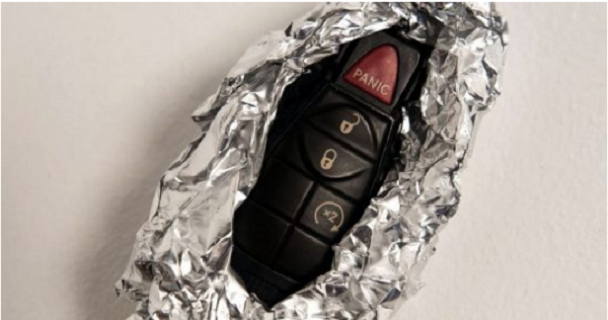Thanks to a tip from a former FBI agent in New York, people are starting to wrap their key fob in aluminum foil. It may seem silly, but there’s a very good reason. Here’s what you should know.

Image for the purpose of visual representation (Photo Credit: Frank Derks/Flickr)
A person’s car is one of the most substantial investments that they make. It gets them to work, transports their kids to sports practices, hauls their weekly groceries, and enables them to do a million other activities most of us take for granted. We’d be lost without our cars. So, it only makes sense to keep this very important investment safe and sound.
Over the years, motorists have researched an endless array of tips, tricks, and devices designed to safeguard their cars. Do you remember The Club? This 1990-era visual deterrent locked onto the steering wheel, alerting would-be thieves that attempting to steal your ride would involve some extra time and effort. While it didn’t prevent theft entirely, most carjackers would move on to another vehicle when they saw The Club.

A driver using The Club on his steering wheel (Photo Credit: Screen Capture/Edmonton Journal/YouTube)
More recent options in automobile security have expanded in complexity with advancing technology. But with cyberhacking an ever-present threat, modern-day drivers now need to consider that their key fob is always vulnerable. Thieves aren’t just breaking into vehicles anymore — they’re hacking into the car’s key fob to gain easy access, and the owner is usually none the wiser, as you can see in the video below.
But before you panic, you should know that there’s a very easy way to deter this sort of theft, and you won’t have to look any further than your kitchen pantry. A simple piece of regular old aluminum foil can be the difference in whether or not a carjacker is able to access your key fob’s signal, reports Consumer Affairs.
Moshe Shlisel is CEO of GuardKnox Cyber Technologies. As an Israeli Air Force veteran, he’s helped develop cyber protection for everything from missile defense systems to weaponized fighter jets. So how does Shlisel store his own key fob at home? He places it in a metal can — then, for good measure, he wraps a piece of regular aluminum foil around it.
Here’s why: Your car is constantly sitting there, quietly receptive, as it awaits a start signal from your fob. There are even devices available that can intensify this signal, and would-be robbers can easily buy them. This means that when your fob is stored somewhere without adequate shielding, crooks can boost or copy the code to access your automobile. According to cybersecurity experts like Shlisel and others, that makes an unprotected key fob on a counter, in a purse, or in a pocket akin to a sitting duck.

Wrap your key fob in aluminum foil to prevent theft. (Photo Credit: Facebook)
Holly Hubert, a former FBI agent and cybersecurity expert, concedes that consumers are hard-pressed to keep up with today’s cyber threat because it’s “so dynamic and ever-changing.” Hubert currently serves as CEO of GlobalSecurityIQ, based in Buffalo, New York. According to WSB-TV, she describes aluminum foil as “the most inexpensive way” to help protect your car’s key fob.
Meanwhile, Shlisel has been meeting with numerous auto manufacturers, collaborating with expert engineers to address this rapidly evolving threat. But in the meantime, he recommends keeping your fob in an aluminum-wrapped can at home — and says that in a purse or pocket, “just aluminum foil will do the job.” Now you know!
